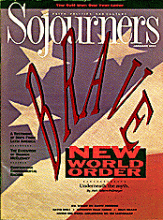British troubadour Billy Bragg is singing some rather discordant notes these days, and it has nothing to do with his ability to stay on key (the judgments of those who balk at Bragg's distinctive style notwithstanding). No, Billy is singing a tune out of harmony with the hallelujah chorus resounding from the halls of international capitalism in celebration over the apparent global demise of communism.
Not that he is troubled by the historic events that have transpired from Moscow to Prague" - good riddance to those career politicians of any stripe who use their power against the people." It is simply the case that the tumbling down of one "wall" has not blinded him to the others left standing, nor made his message promoting human dignity, social equality, and economic justice any less relevant.
Yet as his new release, Don't Try This at Home, so clearly demonstrates, Bragg is not interested in overworn political diatribes or ideologically laden debates. He intertwines themes of romantic love and social revolution, spiritual awareness and political analysis, human tragedy and comic relief, all the while encouraging his audience to dream that the world could quite possibly be otherwise.
The roots of this dynamic mix of social realism and contagious optimism can be traced to his own personal odyssey, which began in a poor, working-class area of East London. A neighbor by the name of Wiggy, who lived in the same drab row of tenement houses, would sit strumming the guitar atop a wall adjacent to the Bragg flat. The echoing notes called Billy to his passion; it was not long before he had convinced Wiggy to teach him how to play as well. The two then embarked on an ill-fated band experiment that journeyed from rock and roll to punk. Dead-end opportunities and unemployment caught up with them.
Read the Full Article

